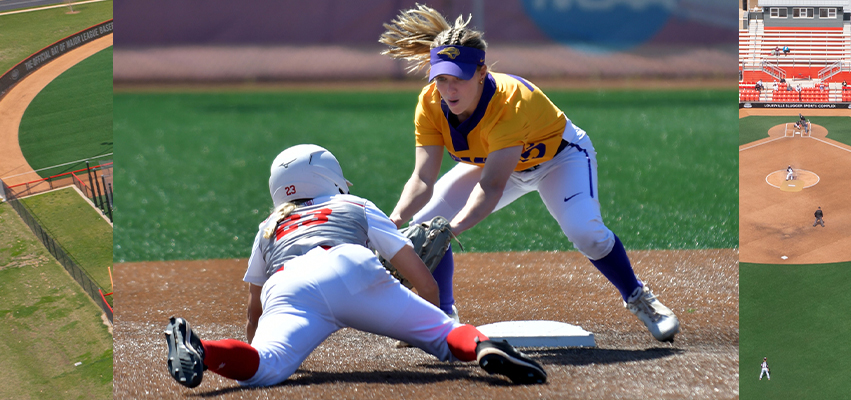
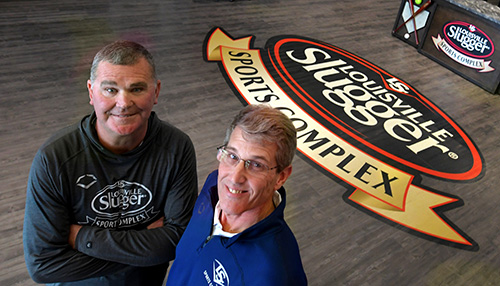
A ballplayer swinging a Louisville Slugger bat is expected to deliver big hits in crunch time. It stands to reason that a business operating under the same name might be primed for the same.
Still, nobody can honestly say they saw this coming. Certainly not in the spring of 2020 with the COVID-19 pandemic in full rage and Illinois public health mandates arguably the most restrictive in the Midwest. But the numbers don’t lie.
“When the Louisville Slugger Sports complex reopened in the summer of 2020, our hotel occupancy skyrocketed,” said J.D. Dalfonso, CEO of the Peoria Area Convention & Visitors Bureau. “Industry experts did not expect sports tourism to flourish. But because of Louisville Slugger, it did here.
“Without them, we’d have been stagnant, at best.”
As COVID-19 cases soared, activity cratered. Restaurants, bars and smaller retail shops closed, some never to reopen. Travel screeched to a halt. Sports and entertainment activities were canceled.
Among the businesses to take a beating was the Louisville Slugger complex, owned by central Illinois hotel magnate Mark Petersen, who maintains a branding partnership with the world-famous manufacturer of baseball and softball bats.
No sports meant no rentals for practices or games, no tickets or concessions or merchandise sold. For the Petersen empire, it also meant no visitors to fill the hundreds of rooms in its five northwest side hotels.
In crisis, Petersen’s management team didn’t wait to see what might happen.
“We came up with some ideas to keep people distanced and safe, and we got great cooperation from the City of Peoria and the Peoria County Health Department,” said Rick Gaa, Louisville Slugger’s vice president of operations.
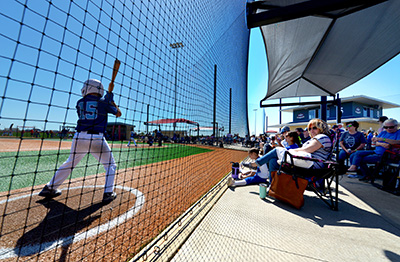 Gaa credits Joe Bolen, director of operations and tournaments for the complex, with innovations that helped convince public officials to allow Louisville Slugger to resume staging events.
Gaa credits Joe Bolen, director of operations and tournaments for the complex, with innovations that helped convince public officials to allow Louisville Slugger to resume staging events.
“We extended the dugouts, so players could spread out,” Bolen said. “We set up a system where people could preorder wristbands (tickets) online, and we set up a drive-thru lane where they could just lean out the window of their vehicle and show their wristbands as they entered. That way, we didn’t have 50 to 100 people standing on top of each other at the gate trying to buy wristbands.”
Other changes included cashless, no-contact payment for concessions and merchandise. Game schedules were staggered to reduce overcrowding. Bleachers were temporarily removed, allowing people to bring their own seats and spread out around the fields.
“Every step we took was about making people more comfortable and trying to keep them from over-congregating,” Bolen said.
The complex reopened on Father’s Day weekend in 2020 – three months after the initial closure – and business has been increasing ever since.
Hotel occupancy in the Peoria area zoomed through July and August, when convention business traditionally lags and was non-existent in that first pandemic summer. Occupancy for July in the Peoria-Pekin market outperformed forecasts by more than 70 percent, according to market research figures at the Convention & Visitors Bureau. From May through October, occupancy exceeded forecasts by 43 percent. Two years later, the numbers continue to exceed expectations.
“Hotel occupancy was up, there was more restaurant business, gasoline sold, retail shopping – much of it because of sports tourism at Louisville Slugger,” Dalfonso said. “Their numbers positively affected the entire region.”
The Louisville Slugger Sports Complex is primarily a softball and youth baseball facility, but there’s much more than meets the eye.
There are 10 outdoor bat-and-ball fields, including two “championship stadiums,” one of which can seat up to 2,500 fans. Two more fields occupy the 125,000-square-foot dome, which also has four competition volleyball courts. The dome floor can accommodate up to 18 volleyball courts. It’s not unusual for the complex to host a major volleyball tournament indoors while staging baseball and softball tourneys outside. The indoor fields also can be easily converted to use for football, soccer and lacrosse.
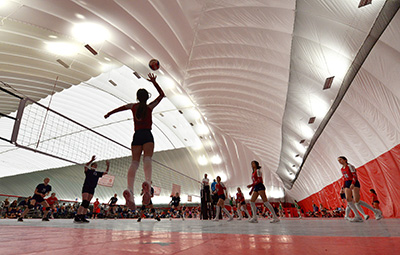 Inside the dome, there’s also a full-service restaurant – the Suite Fire Bar & Grille – in addition to the Slugger Café and a merchandise store where, among other things, you can purchase a Louisville Slugger bat with personalized engraving done on site. Three outdoor-field pods are equipped with their own merchandise shops, concession stands, outdoor kitchens and grilling stations.
Inside the dome, there’s also a full-service restaurant – the Suite Fire Bar & Grille – in addition to the Slugger Café and a merchandise store where, among other things, you can purchase a Louisville Slugger bat with personalized engraving done on site. Three outdoor-field pods are equipped with their own merchandise shops, concession stands, outdoor kitchens and grilling stations.
Each field is artificial turf and includes protected bullpens, dedicated warmup areas, LED scoreboards and shaded bleacher areas. Cameras on each field livestream the action to family and friends at home.
“Plus,” Bolen said, “we have the cleanest restrooms in town. We want to keep mom happy. If mom isn’t happy, nobody’s happy.”
Every day, local athletes and teams use the facilities, sometimes topping 5,000 people in a given week.
Bradley University softball plays its home games there. BU soccer, baseball, cross country and track use the dome for workouts during inclement weather. High schools, club teams and organizations such as the Peoria Christian Center are regulars.
The complex also offers its facilities for rent to non-sports events. The Tailgate N’ Tallboys music festival in June 2021 drew some 10,000 spectators. Gaa doesn’t rule out future music festivals but emphasized the Tallboys event filled a hole in the schedule created by the COVID-19 cancellation of the IHSA state softball tournament.
Besides, the bread and butter of the Louisville Slugger complex is sports tourism. Gaa said the complex doesn’t track total visits, but based on industry averages, upwards of 500,000 people visit the facility annually. The complex is booked 45 weekends in a normal year. During summer months, some “weekend events” – especially national tournaments – are more likely to last five or six days. Those are particularly lucrative. The Great Lakes Nationals softball tournament last July directly infused more than $1.2 million into the local economy, according to the Convention & Visitors Bureau.
Most teams come from surrounding states, but Gaa and Bolen said it is increasingly common to get teams from outside the Midwest, sometimes from as far away as the three coasts.
“We even had a youth baseball group from Sweden,” Gaa said. “They found us on the internet because of the Louisville Slugger name. They flew to Chicago, drove down here and spent four days just to practice and schedule a few practice games.”
That Louisville Slugger brand is “priceless,” Bolen said. But he also credits nearby hotels, restaurants, shopping and the I-474/Route 6 interchange with U.S. 150 less than a mile away.
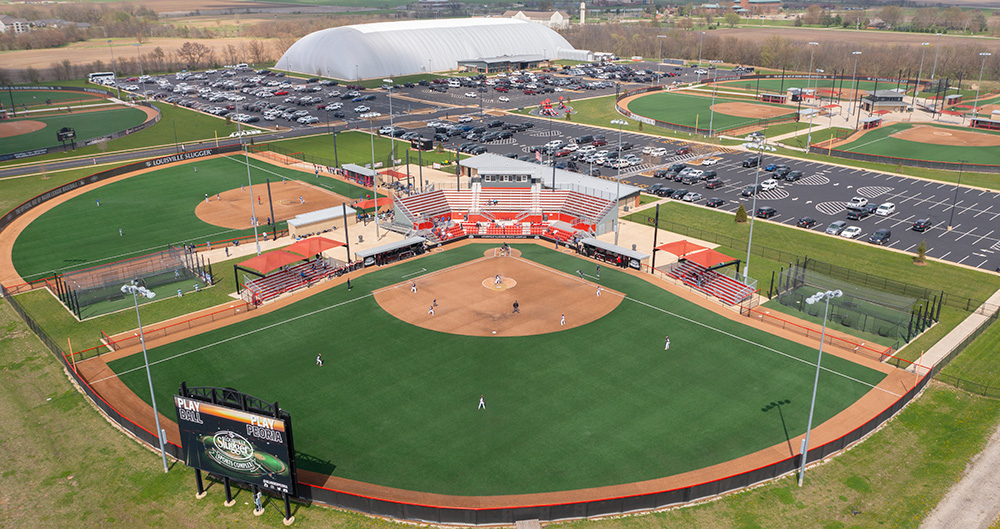
“Many of our competitors in other markets are in the middle of nowhere,” Bolen said.
Gaa declined to discuss plans for expansion. But he acknowledges that remaining viable requires staying ahead of the pack in terms of amenities.
The Louisville Slugger ballfields are sized to accommodate all levels of softball but are too small for baseball by teenagers and older. The market for older age categories is ripe. The complex has land on which to expand.
And if 500,000 people a year are visiting the Louisville Slugger Sports Complex in Peoria now…well, don’t think the idea of a million someday hasn’t been considered.

Kirk Wessler is a former newspaper sports editor who
has turned his attention in semiretirement to a
new passion as a singer/songwriter.

